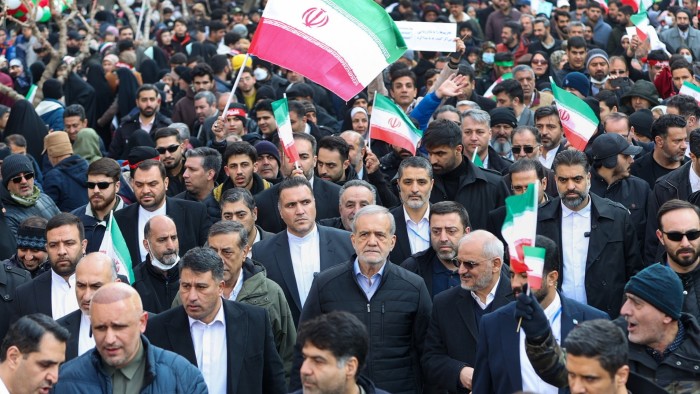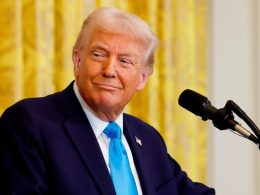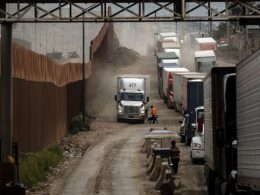Unlock the White House Watch newsletter for free
Your guide to what the 2024 US election means for Washington and the world
Iran’s reformist President Masoud Pezeshkian has called for national unity after the country’s supreme leader ruled out negotiations with US President Donald Trump, sending the rial to a record low on fading hopes of relief from US sanctions and its “maximum pressure” campaign.
Pezeshkian on Monday vowed to follow supreme leader Ayatollah Ali Khamenei — who on Friday said negotiations with Trump would be “neither wise . . . nor dignified” — and accused the US of trying to foment division in Iran.
The US “wants us to remain divided and wait for differences to emerge”, Pezeshkian told a large crowd of pro-regime demonstrators in a speech marking the anniversary of the Islamic revolution. “Brothers and sisters! Set aside your differences. Let us join hands and move forward under the leadership of the supreme leader.”
Diplomats in Pezeshkian’s government, which was elected last year after pledging to secure sanctions relief, had indicated in recent weeks that Iran could be open to discussions with the Trump administration on its nuclear programme.
But Khamenei’s declaration stunned Iran’s political reformers, in effect shutting the door on Pezeshkian’s key policy objective. The rial fell to a record low of 950,000 per dollar on Monday, from 895,000 on Thursday, on expectations of further economic pain.
“There has been a significant shock among many reformists,” said Saeed Laylaz, a political analyst. “Those reformists who lean towards the centre, including Pezeshkian himself, will continue their work as usual, even if the current policy of no negotiations with the US diminishes their public legitimacy.”
Trump signed an executive order last week reimposing his “maximum pressure” policy on Iran to curb what his government says is its pursuit of a nuclear weapon and intercontinental ballistic missiles, and target what it called Iran’s “regional aggression”.
Trump, who in 2018 pulled out of the 2015 nuclear deal between Iran and the world powers and imposed hundreds of sanctions, told the New York Post over the weekend that he would prefer a deal over military confrontation. “I would like a deal done with Iran on non-nuclear,” he said. “I would prefer that to bombing the hell out of it.”
But many across Iran’s political spectrum have rejected the prospect of making broader concessions beyond its nuclear programme. “It is no longer about the nuclear issue . . . it’s also about missiles and conventional and non-conventional weapons. This literally means disarming the Islamic republic,” said Iran’s hardline parliamentary speaker Mohammad-Bagher Ghalibaf on Saturday.
Trump’s order comes with Tehran already at its weakest position in decades, following tit-for-tat strikes with Israel and a devastating Israeli campaign against Iranian regional proxy forces like Hizbollah and Hamas. The Islamic republic’s long-running nuclear stand-off with the west is also coming to a head, with Iran close to enriching uranium at weapons-grade levels.
Pezeshkian on Monday accused Trump of offering negotiations while simultaneously working to undermine Iran. “Trump says, ‘Come and talk’, yet he immediately signs all kinds of conspiracies to bring Iran to its knees,” he said.
“They need internal divisions to fuel their plots,” he said, pledging to strengthen national solidarity and vowing that “we will never bow” before foreign powers.
Mohammad-Sadegh Javadi-Hesar, a reformist politician, did not challenge Khamenei’s position but argued that the possibility of negotiations had not been ruled out entirely. The goal was to send a message that Iran was not desperate and wanted to negotiate with the US on equal terms, he said.
“These are tough pre-negotiation manoeuvres,” he said. “What Trump has proposed now amounts to total surrender, which nobody including Pezeshkian can accept.”
But emboldened hardliners have warned reformists against any attempts to keep open the possibility of talks with the US.
“The supreme leader’s comments were transparent and unequivocal, leaving little room for reinterpretation,” said Hamid-Reza Taraghi, a hardline politician. “Those reformists who sought negotiations with the US to align more with the west and distance Iran from [Russia and China] have suffered a significant setback.”
Source link









